Counter narratives against Jihadism: Truth or propaganda?

Counter narratives against Jihadism: Truth or propaganda?
The topic of the counter narrative -actions
aiming to dismantle the argument on
which terrorists of any kind try to legitimize their immoral actions, make
their demands known and incite potential sympathizers to join their cause- has
aroused extensive comment in recent years in specialized forums against
terrorism, whether academic, governmental or security.
This interest has skyrocketed,
specially, after the control demonstrated by the Islamic State over the art of propaganda, however this is called,
according to the last definition. And is that when the Protestant prince-electors
–to date back just a little- didn’t know a single word of «Strategic Communication Management
Techniques» they used them with extraordinary effectiveness against
the Papal States and Spain: the propaganda existed before it was theorized
about it. Nevertheless, in many contributions about counter narrative, regarding to the story capable
to undermine the attractiveness that the jihadist terrorism has for a certain
sector of the population seems to underlie a marketing idea that probably is
not an adequate strategy.
It is repeated, with enthusiastic
emphasis, that it is precise to delegitimize the Islamic State revealing that
the “real Islam” doesn’t belong to him, that Islam doesn’t approve the
violence, that the jihad has been misinterpreted, that must progress to a
“moderate” Islam. However, there is a lack of approaches that confront the issue with the courage of asking, “what
about if these postulates aren’t true?” What about if the Islamic State defends
an Islam that legitimately can be build from the Quran and the hadiths?” The
jihadist terrorism wont be defeated with a made-up story: should be defeated opposing the historical, political and philosophical truth, being
the one that turns out to be, after a rigorous study and unrelated to the political
correctness.
And for that it is essential to
compromise with the question of “how is it really Islam?” Not how the political correctness explains it, but
how it is explained in its sacred book and the sunnah. How was the life of
Islam’s Messenger. What did Archangel Gabriel “command” Muhammad to do. It is
essential to be prepared that what he was commanded to do was the jihad and, it
is certain that, there is evidence that it could be that way: Muhammad’s
canonical biography, of Ibn Ishaq, represents a skilled military chief that
doesn’t doubt to instigate war when appears to be convenient (like the battle
of Badr), commanding the removal of those who offend him (like the poet Kab Ibn
Al Ashraf) neither in taking revenge against the Jews of Medina when they
resulted to be an obstacle very inconvenient. The Hadiths tell
us, in an exemplary way, that Mohammad’s subjects
took away the life of those who resulted to be inconvenient receiving in
exchange beatitude promises…
The truth is that there is enough
evidence to consider the dreadful possibility that the texts that contain Rumiyah are the correct interpretation of Islam. This idea is not unreasonable,
especially when the Muslim doctrine was definitely set before the second
millennium of our era. It is necessary to consider as soon as possible that
maybe Abu Baker Al Baghdadi has tried to perform exactly what Mohammad proposed
and practiced.
Of course, to clarify if that is the
case is the responsibility of the highest authorities of Islam. But, until that
happens, the most effective counter narrative wont be to repeat an unnecessary made-up
Islam, created in occidental
think-tanks, but to advocate for the implementation, by convincement, of a
moral order in which a person is respected by his inviolable dignity, equal
to his peers, and that excludes the use of violence
for the imposition of an ideal. That narrative
war, an all out war to dismantle the contradictions and the fallacies until facing
each individual with its personal responsibility to
choose or reject forever the violence, is the
only possible one.
Fernando Cantero, Master in Analysis and Prevention of Terrorism.